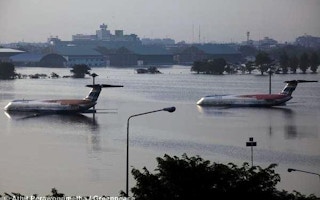The Asia Pacific region needs to spend US$40 billion a year on infrastructure to prepare for the future effects of climate change, said the Asian Development Bank vice president Bindu Lohani on Monday.
But less than 10 per cent of this money to “climate proof” the region’s infrastructure is available today, he told the Asia Pacific Climate Change Adaptation Forum in Bangkok.
“We need this fund now… to make this happen, we must get the money and governance right,” he said in his keynote speech at the two-day summit.
Mr Lohani noted that the added cost of boosting infrastructure to manage future climate disasters such as floods and other extreme weather events is about five to 15 per cent more of investment costs.
This was a necessary spend because “we have a special responsibility to protect the investments that we do… to make sure they are protected from a wide range of risks,” he said.
He pointed out three ways Asian societies can move towards being more resilient to the future effects of climate change - improving knowledge to make better use of resources; using climate investment funds to fund specific projects; and finding a financial structure that will support this “transformational approach”.
Thailand’s vice minister of natural resources and environment Pithaya Pookaman said Thailand was a country that needed such a transformation.
The country suffered its worst floods in half a century last year, which killed more than 800 people and destroyed millions of dollars of properties. The forum was in fact cancelled last year due to the floods and reconvened this year.
Mr Pookaman said Bangkok could be submerged in the next 20 years unless key issues of infrastructure and land use planning are addressed. Thailand has set up a climate change policy board chaired by its Prime Minister Yingluck Shinawatra and is preparing a 10-year masterplan that will focus on addressing climate change, he added.
“The successful implementation of these plans and policies depends on… all levels of government and requires better linkage between research and action,” he told the audience of more than 200 delegates from the region.
The region is facing stark environmental challenges, he noted. Its biodiversity is degraded, ecosystems are over-exploited and poverty is rampant. “Climate change presents a clear and present danger to our lifestyle and existence… our actions to address it are inextricably intertwined with issues of human development,” he added.
“We understand there is no one size fits all approach,” he said, urging policymakers, private sector and civic society participants to “support and take into consideration the actual needs of the most vulnerable population”.
United Nations Environment Programme (UNEP) executive director Achim Steiner, in a video address, called for greater sharing between countries on development planning “so we can learn from one another and shorten the learning curve”.
The Adaptation Forum, in its second year, is organized by the Regional Climate Change Adaptation Knowledge Platform for Asia (Adaptation Knowledge Platform) and the Asia Pacific Adaptation Network (Adaptation Network).
The Adaptation Knowledge Platform is a response to the demand for effective mechanisms for sharing information on climate change adaptation and developing adaptive capacities in Asian countries.
The initiative supports research and capacity building, policy making and information assimilation, generation, management and sharing.
The platform was set up by the Asian Institute of Technology/United Nations Environment Programme Regional Resource Centre for Asia and the Pacific (AIT - UNEP RRC.AP) the Stockholm Environment Institute (SEI), the Swedish Environmental Secretariat for Asia (SENSA) and UNEP with funding support from the Swedish International Development Cooperation Agency (SIDA).










